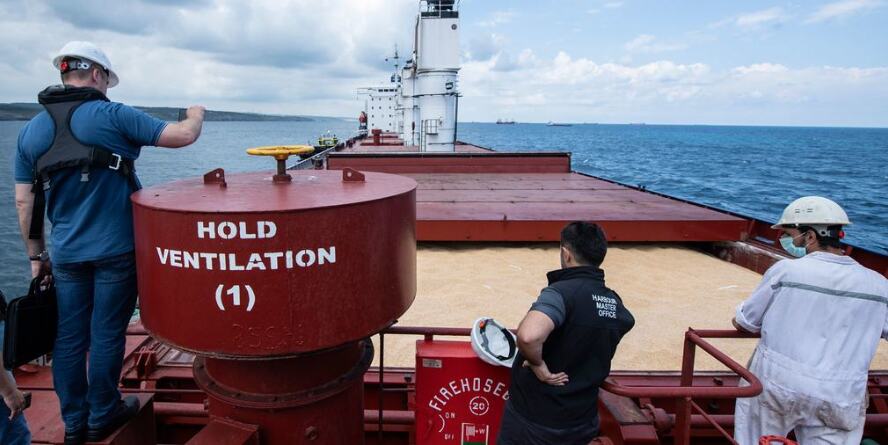Securing Global Food Security: Will Russia Extend the Black Sea Grain Initiative?
Concerns are rising that Russia will not renew the United Nations-backed deal that has allowed grain exports to flow from Ukraine to countries around the world struggling with hunger.
Concerns are rising that Russia will not renew the United Nations-backed deal that has allowed grain exports to flow from Ukraine to countries around the world struggling with hunger.
Food shipments have been dwindling, with ships no longer heading to the war-torn country's Black Sea ports. Turkey and the UN negotiated the breakthrough agreement last summer to ease the global food crisis, as well as a separate agreement with Russia to facilitate shipments of its food and fertilizer.
Despite this, Moscow asserts it is still facing hurdles, though data reveals it has been exporting record amounts of wheat. Officials in Russia have declared that there are no grounds for continuing the Black Sea Grain Initiative.
This has been threatened in the past, yet the deal has been extended twice for two months rather than the four months outlined in the agreement. The UN is attempting to keep the deal in place, given that Ukraine and Russia are both major suppliers of wheat, barley, vegetable oil and other food products, which are essential in Africa and parts of Asia.
The initiative has helped lower international prices of food commodities like wheat after they skyrocketed following the invasion last year. Nevertheless, it has not made a significant difference at the kitchen table.
Russia's withdrawal from the agreement would mean the end of World Food Program aid for countries at risk of famine, including Somalia, Ethiopia and Afghanistan. It would also cause additional food security problems in already vulnerable places struggling with conflict, economic hardship and drought.
The Fragile deal has enabled Ukraine to ship 32.8 million tonnes of grain, with more than half of this going to developing countries. However, the amount of grain leaving Ukraine has been decreasing.
This is due to Russia slowing joint inspections of ships by Russian, Ukrainian, UN and Turkish officials, and refusing to allow more vessels to join the initiative. Average daily inspections — meant to ensure vessels carry only food and not weapons — have dropped from 11 in October to just over two in June.
This has caused grain exports to fall from 4.2 million metric tons in October to 1.3 million in May, which is the lowest for the year-old initiative. There was a slight rise to two million in June as shipment sizes grew.
The UN is negotiating with Russia to keep the initiative alive, while Ukraine's Infrastructure Ministry said two ships are loading grain at the moment, headed for Egypt, and 29 vessels are waiting in Turkish waters awaiting inspection.
Russia's intentions If the deal isn't extended, other countries will have to look for alternative sources for imports, likely Russia, which may have been the intention all along.
Russia has been pushing for carveouts from sanctions on the Russian Agricultural Bank, as well as movement on its ammonia, a key ingredient in fertilizer, to a Ukrainian Black Sea port.
However, the ammonia pipeline has been damaged in the war. In spite of this, Russia has seen wheat exports reach all-time highs after a large harvest. Shipments increased from 33 million metric tons in 2021 to 44 million last year and are expected to reach 46 million this year, according to S&P Global Commodity Insights.
Ukraine's shipments have declined by around 60%, from 19 million tons in 2021 to predictions of 7 or 8 million tons this year, which has had a major impact on its agriculture-dependent economy.
The world's available wheat stocks are still the same as in 2021, which means there is enough to go around. Even if the Black Sea deal is not renewed, grain prices are not expected to go up by more than a temporary bump on world markets, as markets adapt quickly. E
urope and Argentina are expected to boost wheat shipments, while Brazil has seen a banner year for corn, which Ukraine is also a major supplier of.




